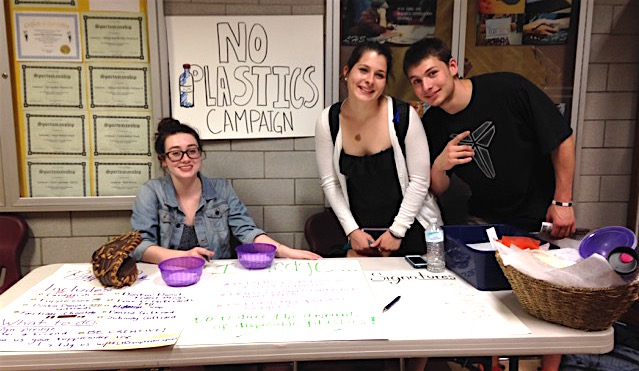By Katie Williamson –

Students at Lebanon High School, NH
Recently, I have been thinking about where visioning and systems thinking fit into school classrooms. What strategies and tools could help students and young people connect with systems? Would they even find systems thinking useful for their own work and goals? So when Marta and I got invited to present in a couple classrooms in surrounding towns, we launched our own kind of experiment about systems trainings. Last fall, we designed an introductory three-hour module on systems thinking for a Sustainable Living course at Lyndon State College in northern Vermont. This past May we created a design-thinking curriculum for an AP Environmental Science class at Lebanon High School in New Hampshire. Each opportunity brought its own expectations and challenges due to each unique learning environment and group of students.
Before we arrived at Lyndon State, the professor told us we would enter an environment of pragmatism and varying levels of exposure to sustainability. Most students were adult-learners in the stage of their lives where jobs and family commitments were equal responsibilities to getting a degree. Our hope was to use their individual projects on sustainable living as a way to think about problem solving with systems thinking.
We learned about homemade soaps, small-scale compost systems, foraging for edible plants, and recycled t-shirt bags as examples of sustainable habits. But it was hard to tell which elements of our module stuck with them. The Moon Ball game? The iceberg model? The case study on pesticide dependence in India? Instead, what stood out to them was the joy of sharing ideas with a classmate and learning how to be more open-minded when thinking about a problem. This was again a reminder of how sparking collaboration should remain a key focus of our trainings.
Next were our senior students at Lebanon High School. We prepared a much more hands-on experience, delving deeper into mindsets and how they affect the design of any sustainability campaign. Unlike the students at Lyndon State, these students were eager and ready to make a difference as a team. They were dreamers. They finished our sentences about the importance of root causes, defined systems for us, and set ambitious goals to launch a short campaign for reducing disposable plastics in their school.
We continued working with the students over a month as they envisioned and actualized their campaign. When the campaign was over, we sat in a circle together and reflected on our efforts. Somewhere in the midst of window artwork, pinning ribbons for support, collecting days’ worth of plastic bottles, and gathering signatures, the vision became muddled about what reducing plastics really looks like and how to do it effectively. The students said they could have been more realistic but still learned a lot about what matters and appeals to high schoolers as a way to influence their behavior. Being seniors in the last few weeks of high school they felt that they had limited time, resources, and leverage to truly prevent plastics from entering the school system.
This raised the question for us of how to best partner with school teachers so to help them and their students apply systems thinking and achieve lasting change within the school system.
In both trainings, our goals for the students changed once we better understood the learning environment and the systems of which they were a part. More than ever, I am convinced that systems are truly everywhere, often implicitly rather than explicitly. Seeing systems and working with them takes time and practice. These experiences have helped me reflect on how to adapt when plans change and be more perceptive when trying to match the visions, mindsets, and feasible goals of others. Now onto my next task: carrying these insights from being a teacher talking about systems in the classroom, to being a student of systems in another classroom when I start graduate school this fall!







